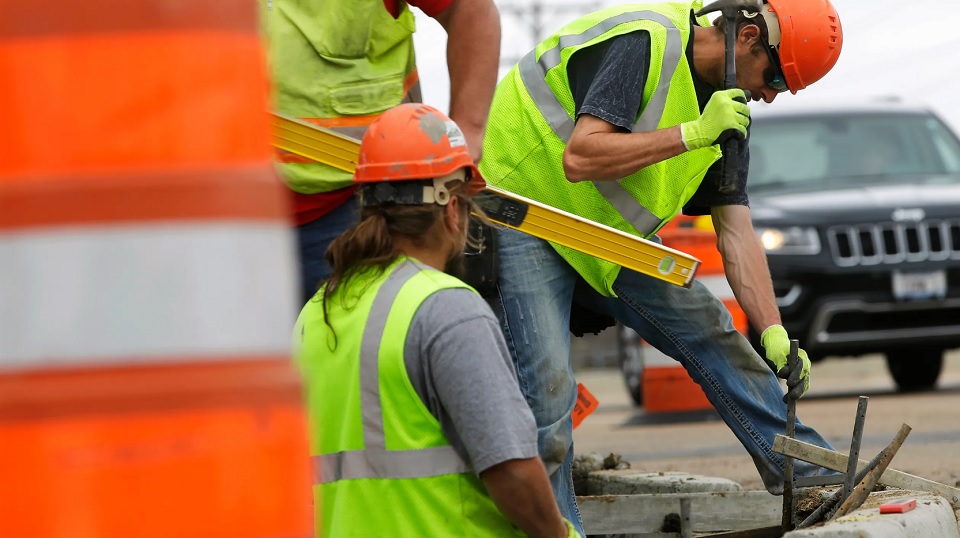
WASHINGTON —The nation’s building trades unions are cheering new regulations for the almost-century-old Davis-Bacon Act—regulations that will mean higher pay for construction workers, especially in rural areas, more workers covered, and tougher Labor Department enforcement against shady construction contractors who flout them.
The rules, announced August 9, set prevailing wages for federally funded construction projects, a universe of construction that is expanding greatly after last year’s approval of the five-year $1.2 trillion infrastructure law and two other laws, including the CHIPS Act.
The key change is to undo Republican-engineered prevailing wage rates which reduced both how many construction workers Davis-Bacon would cover and the levels of “prevailing wages” set in each specific geographic area for each construction craft.
The new rules, to take effect after a mandatory comment period, “return to the definition of ‘prevailing wage’ used from 1935 to 1983 to ensure prevailing wages reflect actual wages paid to workers in the local community,” DOL said. And those rates would be periodically updated “to address out-of-date wage determinations.”
The top change is if at least 30% of a geographic area’s workers in a construction craft earn a particular wage, it would become the “prevailing wage” for workers in that craft on all federally funded construction.
Under the Reagan-era rules, the prevailing wage was the wages paid to at least half of all workers. If no rate covered more than half of the workers, the “prevailing wage” was “a weighted average” of all wage rates for all construction workers in that craft in that area.
In practical terms, that meant the non-union low-ball construction companies’ wage rates could drag down everybody’s wages. The 30% rule supersedes that.
The new rules also expand coverage. The biggest expansion incorporates rural counties—where contractors typically pay less—with nearby metro area prevailing wage rates, as long as the plurality of covered workers toils in the metro areas.
Thus, construction workers in rural counties adjoining metro Chicago would have the same prevailing wage rates as those in metro Chicago. Which means the rural workers’ wages would rise, whether they’re building a highway, extending a commuter rail line, or installing broadband.
In a further expansion, workers on federally funded construction projects which stretch over more than one geographic area—such as an interstate highway—would all be paid at the highest prevailing wage rates for their crafts.
So, for example, if workers are rebuilding Interstate 70 West from Columbus to Springfield, Ohio, the prevailing wage would be the same all along the project—and it would be the prevailing wage in the Columbus metro area, in all likelihood.
“The Biden administration’s final rule to update” the Davis-Bacon regulations “is landmark and historic and will protect the wages of millions of construction workers, including LIUNA members,” said Laborers (LIUNA) President Brent Booker.
It “strengthens federal prevailing wage regulations and restores the law to its original intent after it has been watered down over the last 40-plus years,” added Sean McGarvey, president of North America’s Building Trades Unions. “This ruling is a win for ALL construction workers, both union and non-union, for good and fair contractors, and for America’s taxpayers.” (His emphasis.)
That includes workers who toil not just on traditional construction projects—building roads, subways, airports, bus lanes, and the like—but also more-modern infrastructure, such as solar panel arrays, broadband, and retrofitting structures to cut carbon emissions.
Including a mandate
Including a mandate to pay Davis-Bacon wages on broadband installation, which would employ tens of thousands of Communications Workers, drew that union’s support for the CHIPS Act, Congress’s and Biden’s second big infrastructure law. That multibillion-dollar law subsidizes microchip plant construction in the U.S., including a huge complex outside Columbus, Ohio.
Biden, Harris, and the DOL “had the vision and determination to reverse a [prevailing wage] rule in effect for 40 years, which fundamentally altered and eroded the wages of construction workers,” the Laborers’ Booker added. “With massive investments in infrastructure…creating hundreds of thousands of new jobs with prevailing wage rules, construction workers across the nation will benefit from the strengthened wage floor.”
The Republican Reagan administration changed the rules to favor low-ball contractors and Biden’s Labor Department undoes that, added Electrical Workers President Kenneth Cooper. He called the administration’s rules “a victory for construction workers across the country.
“The final rule reverses Reagan-era changes that weakened the law’s original intent–ensuring federally funded or assisted projects support good-paying local jobs for local workers.
“For the past 40 years, a single low-wage contractor could depress wage rates on federal contracts. This rule change will allow construction workers to gain ground they lost in the 1980s, increasing the wages of millions and preventing low-road contractors from undercutting the workforce.
“It is proof once again, that union members are at the heart of the Biden-Harris administration’s efforts to rebuild America by restoring the middle class,” Cooper said, after Vice President Kamala Harris, flanked by Acting Labor Secretary Judy Su, Laborers Mid-Atlantic Vice President and Regional Director Dennis Martire, and other unionists, unveiled the new rules in a ceremony in a Philadelphia union hall.
As might be expected, Rep. Virginia Foxx, R-N.C., the union and worker hater who chairs the House Education and the Workforce Committee, screeched in her release’s headline that “Biden’s Davis-Bacon rule is nothing but pork to Big Labor,” using a common Republican anti-union canard atop her diatribe.
And last year, the Senate Labor Committee’s Republicans sent a long letter to then-Labor Secretary Marty Walsh, detailing their objections to what was then a proposed rule. Ironically, their missive hit many of the high points for workers, all of which the Republicans oppose.
One is they don’t want rural construction workers to get higher pay.
“By rescinding a key element of the 1982 reform that prohibited cross-consideration of metropolitan and rural wages, the Department ensures any wage calculation will over-count inflated urban wages as prevailing in smaller rural areas,” they wrote.
And “expanding DOL’s debarment and withholding powers and imposing Davis-Bacon prevailing wage obligations…regardless of whether prevailing wage language is contained within the [construction] contract…places onerous paperwork burdens on contractors while violating basic tenets of procedural due process,” they wrote. Debarment and withholding are two key DOL levers against Davis-Bacon violators.
The Republican senators also objected to DOL rewarding whistleblowers who expose cut-rate contractors. “By attempting to impose, via executive rulemaking, remedial make-whole relief for whistleblowers despite lacking express statutory authority to do so, DOL…violates the separation of powers principles,” the Republicans alleged.
We hope you appreciated this article. At People’s World, we believe news and information should be free and accessible to all, but we need your help. Our journalism is free of corporate influence and paywalls because we are totally reader-supported. Only you, our readers and supporters, make this possible. If you enjoy reading People’s World and the stories we bring you, please support our work by donating or becoming a monthly sustainer today. Thank you!










